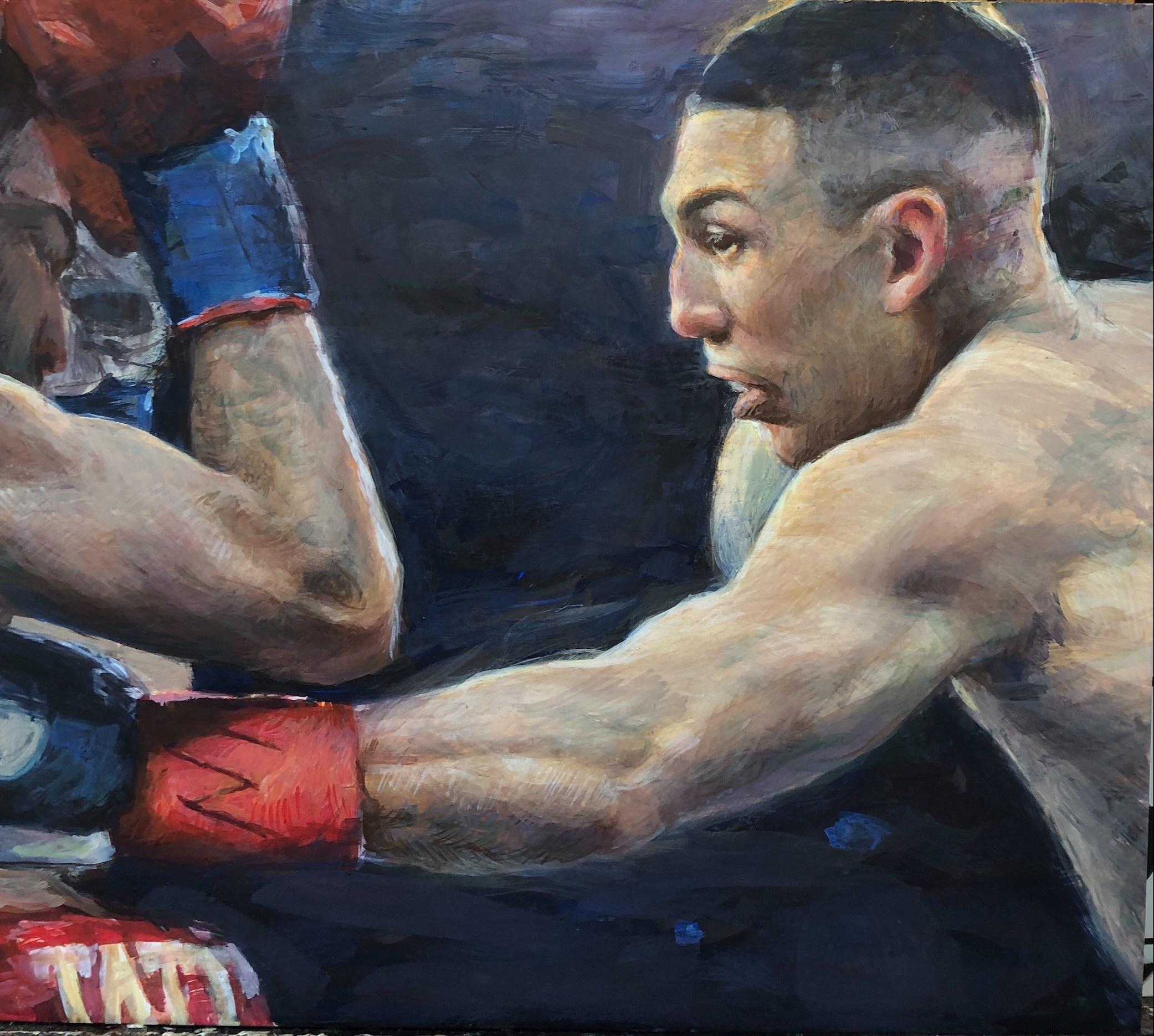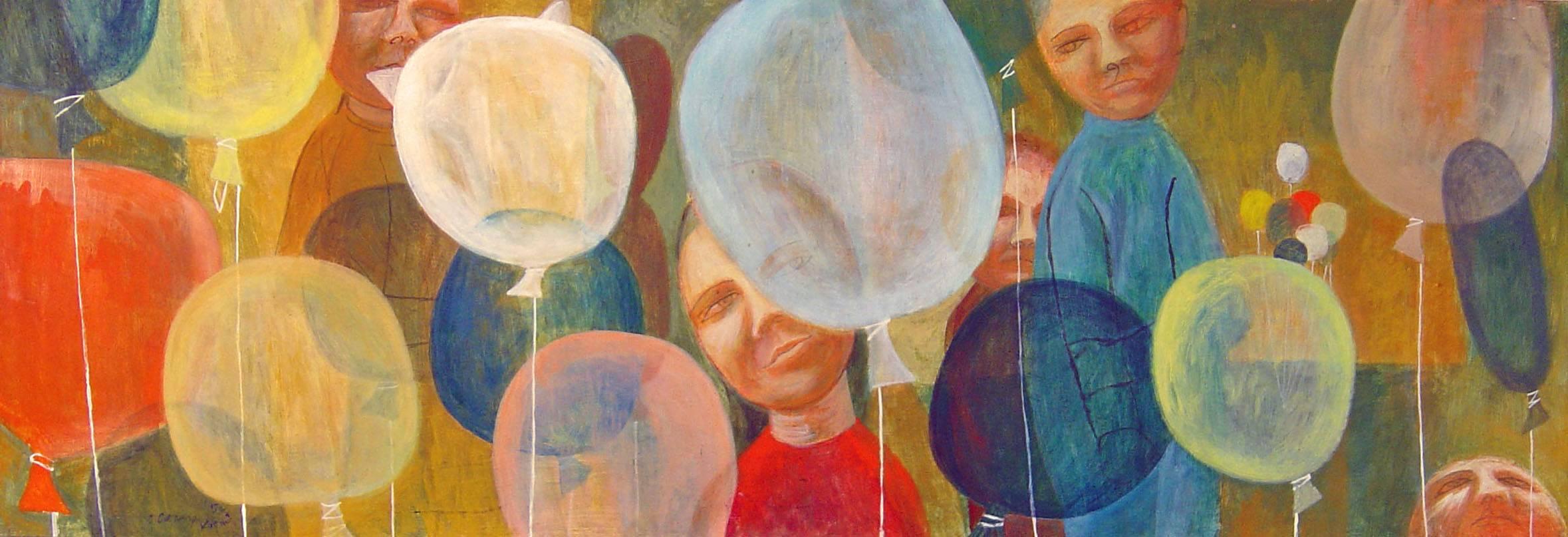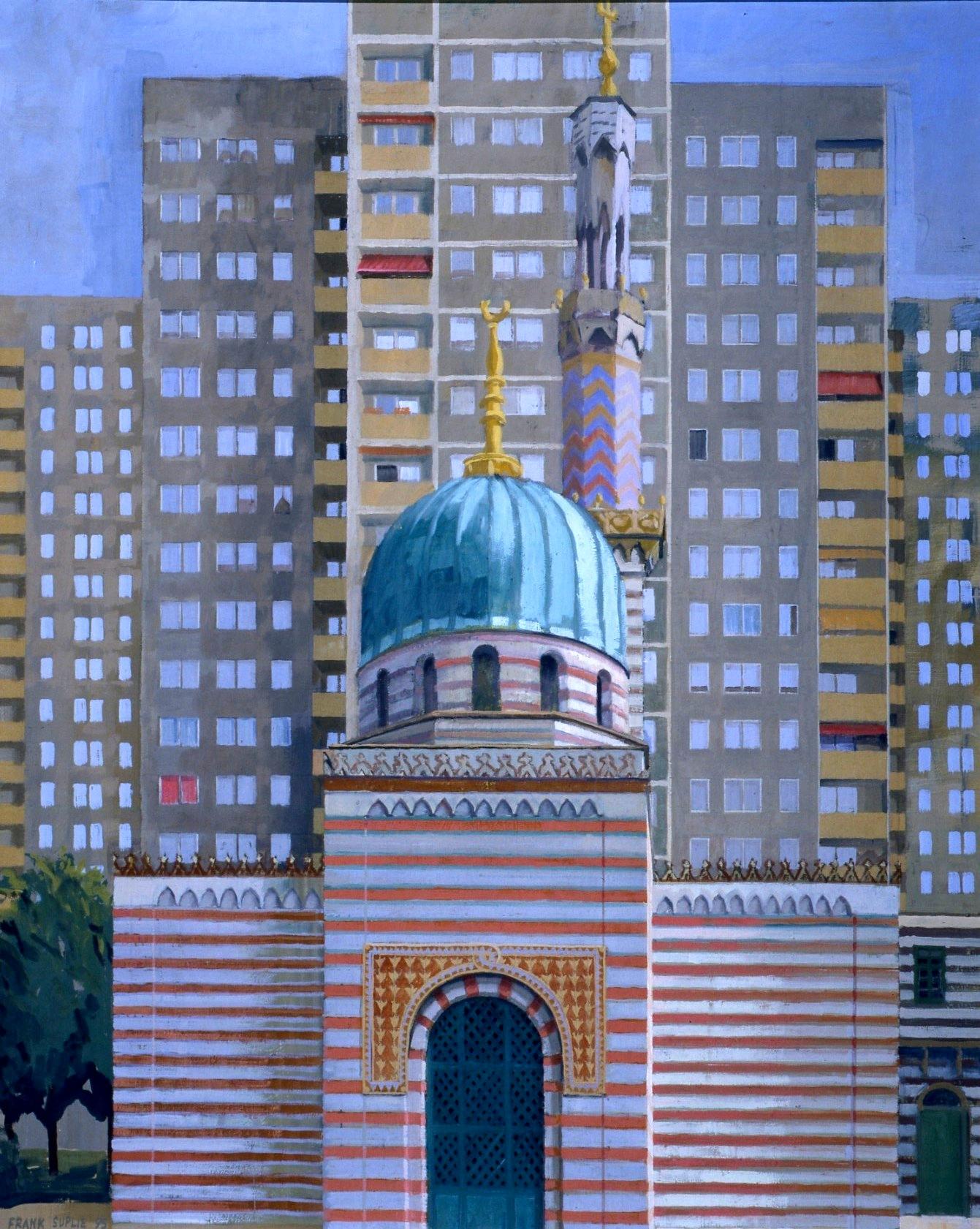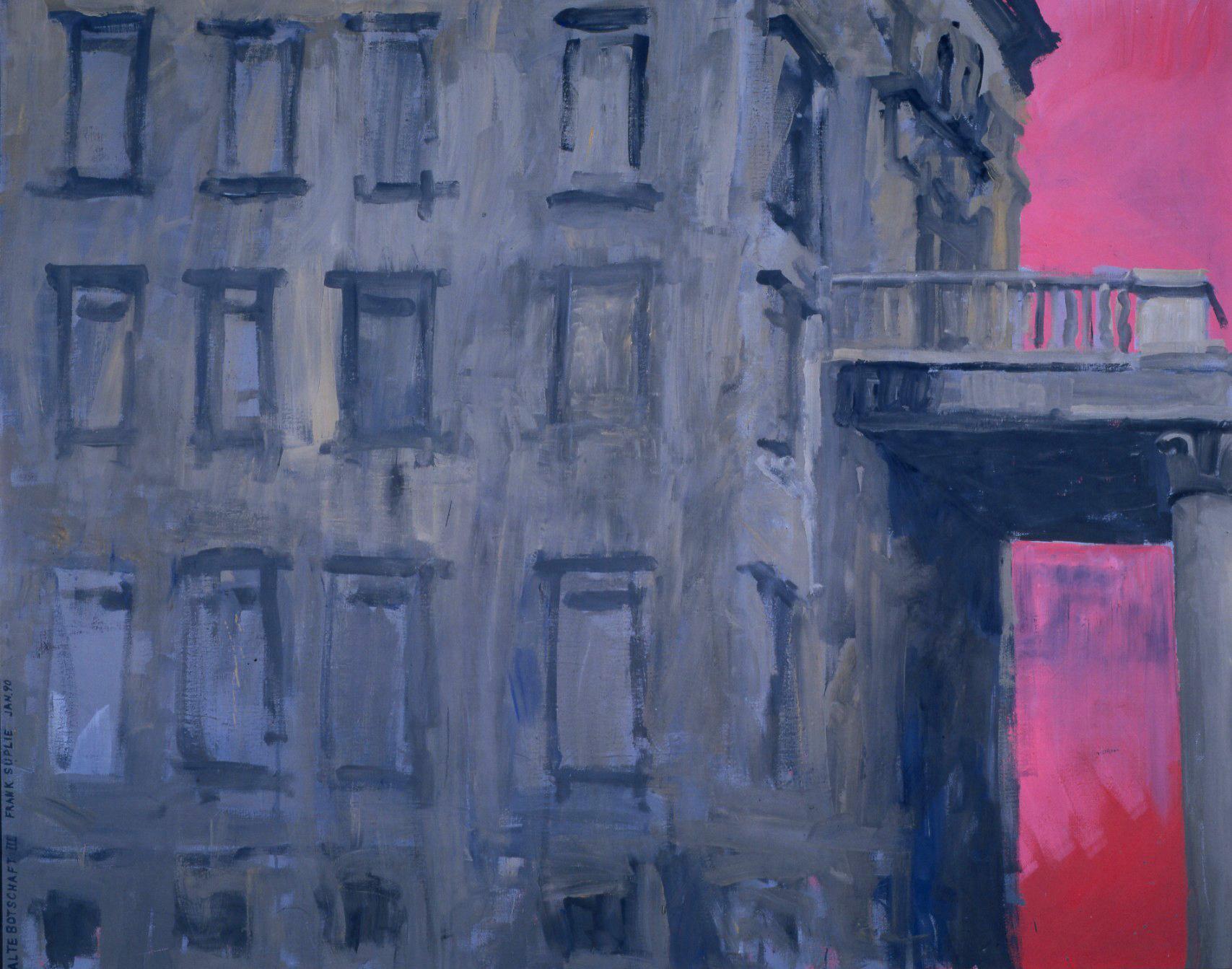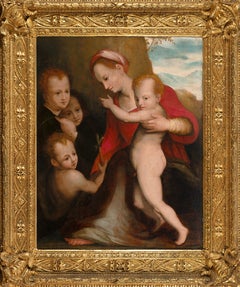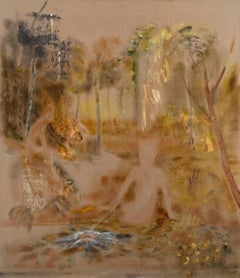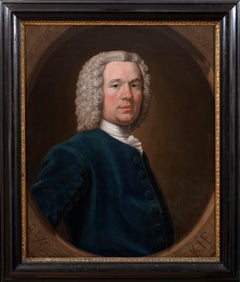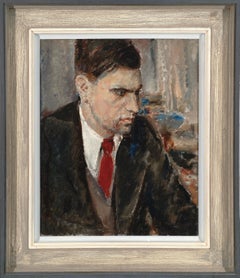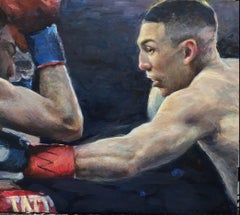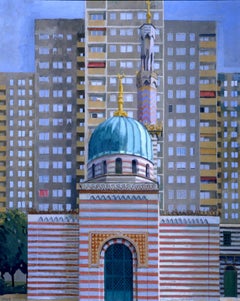Items Similar to An icon depicting Saint Charalambos
Want more images or videos?
Request additional images or videos from the seller
1 of 11
UnknownAn icon depicting Saint Charalambos
About the Item
Greek, 18th century
An icon depicting Saint Charalambos
Painted with a Christogram and crucifix verso
Egg tempera, gilt and gesso on panel, within a gilded frame border
45.4 x 35.5 cm.
Provenance:
Private Collection, Greece;
Private Collection, United Kingdom;
Saint Charalambos, a martyred early Christian priest of Magnesia on the Meander (Asia Minor), is depicted enthroned, holding open a Gospel book as he raises his right hand in blessing. Clad in richly embroidered and jewelled vestments, his red phelonion is decorated with gilt floral sprays and an elaborate collar trim set with precious gems. A bejewelled cincture hangs at his waist. The icon is profusely gilded throughout, applied to a layer of gesso which constitutes the punched halo encircling the Saint’s head, and the intricate design of the throne and surrounding motifs. The relative naturalism and colouring of the icon is characteristically Greek, of the 18th century. The work was acquired in Greece and passed by descent for three generations to a private British collection.
The reverse of the panel is adorned with a Christogram, arranged in pairs between the arms of a Latin cross. Reading ‘IC/XC/NIKA’ (‘Jesus Christ Conquers’), the monogrammatic formula derives from the Greek ‘IHCOYC XPICTOC’, representing the first and last letters respectively of the translation for ‘Jesus Christ’. The ancient Christogram is typical of the Orthodox visual tradition.
Saint Charalambos, reputedly living between 89-202 AD during the reign of the Roman Emperor Septimius Severus, was an early Christian priest in Magnesia on the Maeander, an ancient Greek city in Ionia, on the western coast of Asia Minor (or Anatolia). Charalambos spread the Gospel in the region and openly confessed his Christian faith. As such, he is said to have been brought in front of the proconsul, Lucian, and military commander, Lucius, who condemned him to torture. Upon witnessing the Saint’s resolve, two Roman soldiers too confessed their Christian faith, and were beheaded, along with three female onlookers who had done the same. Lucius picked up the instruments of torture before his forearms were preternaturally dismembered. When Lucian spat in the face of the Saint, his head was turned entirely so as to face backwards. Both men prayed for mercy, and were healed by Charalambos. He was afterwards taken to Septimius Severus and subjected to further torture, before being executed. The feast day of Saint Charalambos is celebrated on the 10 February.
- Dimensions:Height: 17.88 in (45.4 cm)Width: 13.98 in (35.5 cm)
- Medium:
- Period:
- Condition:The work is in distressed though stable condition. Craquelure and losses to the gilding can be seen throughout, with pigment loss concentrating around the lower robes and upper neck and face of the Charalambos.
- Gallery Location:Maidenhead, GB
- Reference Number:1stDibs: LU2820215584622
About the Seller
New to 1stDibs
Joined in the past six months.
No Reviews Yet
Vetted Professional Seller
Every seller passes strict standards for authenticity and reliability
Established in 2024
1stDibs seller since 2024
- ShippingRetrieving quote...Shipping from: Maidenhead, United Kingdom
- Return Policy
Authenticity Guarantee
In the unlikely event there’s an issue with an item’s authenticity, contact us within 1 year for a full refund. DetailsMoney-Back Guarantee
If your item is not as described, is damaged in transit, or does not arrive, contact us within 7 days for a full refund. Details24-Hour Cancellation
You have a 24-hour grace period in which to reconsider your purchase, with no questions asked.Vetted Professional Sellers
Our world-class sellers must adhere to strict standards for service and quality, maintaining the integrity of our listings.Price-Match Guarantee
If you find that a seller listed the same item for a lower price elsewhere, we’ll match it.Trusted Global Delivery
Our best-in-class carrier network provides specialized shipping options worldwide, including custom delivery.More From This Seller
View AllThe Virgin and Child with the Infant Baptist
By Andrea Del Sarto
Located in Maidenhead, GB
Florentine, mid-16th century
Circle of Tomaso D’Antonio Manzuoli, known as Maso da San Friano (1536-1571)
The Virgin and Child with the Infant Baptist
After Andrea del Sarto (1486-1...
Category
15th Century and Earlier Renaissance Figurative Paintings
Materials
Oil
Cinder
Located in Maidenhead, GB
Joel Tomlin (b. 1969)
Cinder, 2004
Oil on linen
Signed and titled verso
183 x 157 cm.
Provenance:
Joel Tomlin;
MW Projects, London, 2004;
Permanent Collection, Saatchi Gallery;
Chri...
Category
Early 2000s Contemporary Landscape Paintings
Materials
Oil
$8,809
Portrait of George Gordon, 7th Laird of Buckie (1707-1756)
By John Alexander
Located in Maidenhead, GB
John Alexander (Scottish, 1686-1766)
Portrait of George Gordon, 7th Laird of Buckie (Scottish, 1707-1756), c. 1743
Oil on canvas
In a carved ebonised frame, with gilded inner slight...
Category
1740s Old Masters Portrait Paintings
Materials
Oil
Young Man in a Red Tie
Located in Maidenhead, GB
Dame Ethel Walker DBE ARA (1861-1951)
Young Man in a Red Tie
Oil on canvas
51 x 40.6 cm.; (within frame) 70 x 59.7 cm.
Provenance:
The Lefevre Gallery, London, stock number X890;
Christie’s, London, Modern British Pictures, Watercolours, Drawings and Sculpture, 12 September 1996, lot 58;
Bonhams, London, Modern British and Irish Art, 23 November 2022, lot 177;
Private Collection, United Kingdom.
This focussed composition is dominated by a handsome young man in profile, frowning with a concentrated glare. His slender cheeks meet a jaw brushed with a masculine grey, complimented by the blue of a flower or pocket square, and the shadow of a loose strand of oiled hair that rests across his forehead. The stylistic sophistication shows Walker at her best, ambitiously combining measured figuration with expressive abstraction, as delicious dashes of pigment appear still wet, and dissonant swipes energetically mark the surface of the canvas. With an elegance that borders on the effete, the sitter’s urbane style includes a spearpoint collar, framed by the wide lapels of his suit jacket. Most significantly, the young man’s dandyish fashion is augmented by the conspicuous titular red tie which he wears – an established expression of queerness in the 20th century. Painted by the lesbian artist Dame Ethel Walker, it is likely that the portrait is that of a gay man belonging to London’s queer artistic circles. Indeed, Walker’s male sitters (who constitute but a fraction of her output) are typically conceived as modish, and often wear striking colourful ties. Walker was one of the earliest lesbian artists to overtly explore her sexuality in her works, and an aesthetic fascination with the female form culminated with her glorious large-scale ‘decorations’, exemplified by Decoration: The Excursion of Nausicaa (Tate, N03885).
Red neckties had been established in the 20th century as a coded (though appropriately colourful) expression of queerness, not dissimilar to the green carnation of the Wildean aesthetes. The gay writer and musician Mikhail Kuzmin was painted in 1909 in a stark red tie. Two decades later, the Anglo-French physician Havelock Ellis described the red necktie as an emblem amongst queer New Yorkers: ‘[…] there has been a fashion for a red tie to be adopted by inverts [homosexuals] as their badge’ (Ellis, p. 299). The motif permeated fiction, and in Thomas Mann’s 1912 novel Death In Venice, the protagonist Gustav von Aschenbach begins to wear a red necktie after he develops an infatuation with a beautiful young boy staying at his hotel. William Faulkner’s 1929 novel The Sound and the Fury includes an unnamed male character identified throughout by his distinctive red necktie, which is the subject of veiled insinuations against his masculinity.
Walker must surely have been familiar with this symbolic importance when she executed the present portrait. Her few portraits of male sitters include colourful neckties almost exclusively, and include numerous examples of red neckties. Indeed, the artist herself preferred to wear a red tie, a declaration which so impressed itself on Virginia Woolf that she noted it in a diary entry after tea with Walker (Bell, p. 282). Walker, who painted Woolf’s sister Vanessa Bell, had once offered to paint Woolf in the nude, as Lilith. Around the same time, Augustus John painted the gay peer Evan Morgan, 2nd Viscount Tredegar, in a loose red necktie or neck scarf. The portrait passed through the Lefevre Gallery, which also represented Walker, and which inventoried the present work. While the sartorial choice may have been incidental, a colourful accessory chosen to enliven the portrait, its prominent inclusion would suggest a personal significance to Walker, the recognition of a shared experience between artist and subject.
Dame Ethel Walker was hailed as a leading female artist of her generation, and as late as 2010 was one of only four women artists to have been honoured as a Dame Commander of the Order of the British Empire. Walker was born in Edinburgh in 1861 to the botanist Arthur Abney Walker, a descendent of the Walker family of iron industrialists, whose estates included Clifton House (Rotherham) and Blythe Hall (Nottinghamshire). She attended school in London after the family moved to Wimbledon, and in 1880 met the fellow artist Clara Christian, with whom she would form an important personal and professional bond. The women’s relationship was later allegorised by the writer George Moore as that of Stella (Christian) and Florence (Walker) in his fictionalised three-volume memoir Hail and Farewell. Walker went on to Putney School of Art and Westminster School of Art, and studied under Frederick Brown, who became a lifelong mentor. Around 1893 Walker took further study at the Slade School of Art, partly under Walter Sickert, and returned in 1912, 1916, and 1921. Although Walker enjoyed painting floral still lifes and seascapes, her best work was portraiture. She worked from her studio at 38 Cheyne Walk for most of her career, and enjoyed a prominent role in London’s artistic milieu. Her sitters included the artists Lucien Pissarro, Orovida Camille Pissarro, Vanessa Bell, and Barbara Hepworth; she painted Nancy Astor, the Countess of Strathcona, the editor Joan Werner Laurie, and author Leo Walmsley. The actors Flora Robson and Elsa Lanchester sat for Walker, as did the young Christopher Robin Milne. Walker herself was photographed by the bisexual photographer and painter Humphrey Spender...
Category
Early 20th Century Post-Impressionist Portrait Paintings
Materials
Oil
Tête d’expression portrait study of a gentleman
Located in Maidenhead, GB
French Academic School, 18th century
A tête d’expression study of a gentleman, c. 1780-90
Oil on canvas
46.1 x 35 cm.; (within frame) 57.5 x 46.6. cm.
Provenance:
Private Collectio...
Category
1780s French School Portrait Paintings
Materials
Oil
Pleasant Thoughts
Located in Maidenhead, GB
Petra Schott (German, b. 1953)
Pleasant Thoughts, 2021
Mixed media on canvas
Signed lower right
100 x 80 cm.; (within frame) 110 x 90 cm.
Born in Hanover in 1953, Petra Schott studi...
Category
2010s Abstract Abstract Paintings
Materials
Oil, Acrylic
You May Also Like
"Birth of Christ" after a Russian icon of the 15th century. Oliver Samsinger
Located in Segovia, ES
"Birth of Christ", after a Russian icon of the 15th century.
Tempera and gold leaves on gesso, wooden board. Dimensions: (H) 68 x (W) 52 x (D) 4 cm.
This icon sums up the events of the birth of Christ. At the top left the three wise men from the Orient approach on horses.
ABOUT THE ARTIST
Oliver...
Category
1990s Byzantine Mixed Media
Materials
Gold Leaf
$2,663 Sale Price
20% Off
Teofimo Lopez , The Champ, egg tempera, World Champion, Finalist PSA
By E. Melinda Morrison
Located in Houston, TX
"The Champ" is an egg tempera painting of Teofimo Lopez who is also known as The Takeover after winning four belts in his last fight. He is ranked # 1 in his weight class. The painting by E. Melinda Morrison...
Category
2010s American Impressionist Portrait Paintings
Materials
Egg Tempera
$2,720 Sale Price
20% Off
Parade
By Catherine Koenig
Located in Buffalo, NY
An original egg tempera painting by American female artist Catherine Koenig.
Category
1950s Modern Figurative Paintings
Materials
Egg Tempera, Board
German Contemporary Art by Frank Suplie - Potsdam, Dampfmaschinenhaus, Moschee
Located in Paris, IDF
Frank Suplie is a German artist born in 1950 lives and works in Berlin, Germany. He is a member of the Painters Association of the North German Realists since 2006. He paints everyda...
Category
2010s Realist Landscape Paintings
Materials
Canvas, Egg Tempera
$20,400 Sale Price
20% Off
German Contemporary Art by Frank Suplie - Rheinschiefer
Located in Paris, IDF
Frank Suplie is a German artist born in 1950 lives and works in Berlin, Germany. He is a member of the Painters Association of the North German Realists s...
Category
2010s Realist Landscape Paintings
Materials
Canvas, Egg Tempera
$15,520 Sale Price
20% Off
German Contemporary Art by Frank Suplie - Berlin, alte Botschaft, Macht & Tod
Located in Paris, IDF
Frank Suplie is a German artist born in 1950 lives and works in Berlin, Germany. He is a member of the Painters Association of the North German Realists since 2006. He paints everyda...
Category
2010s Realist Landscape Paintings
Materials
Canvas, Egg Tempera
$19,360 Sale Price
20% Off
